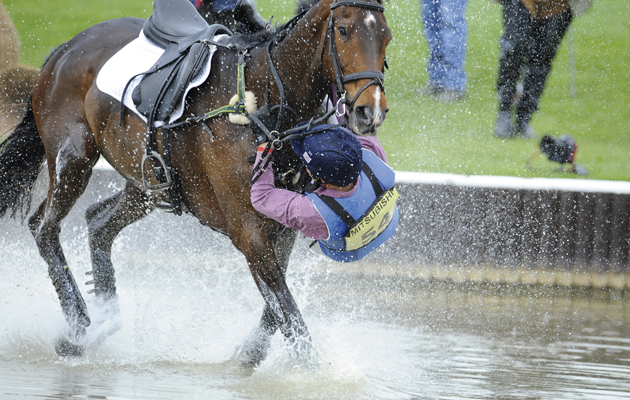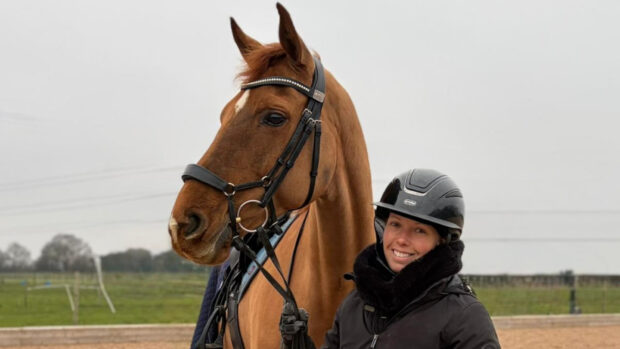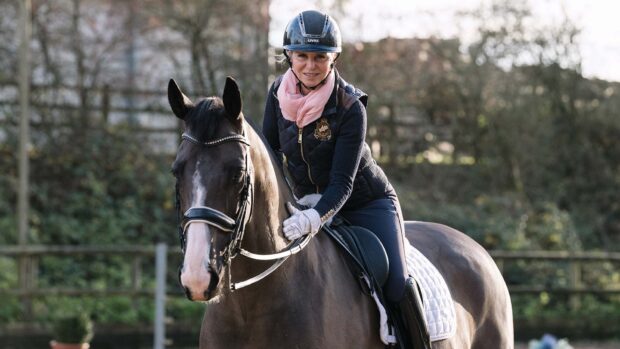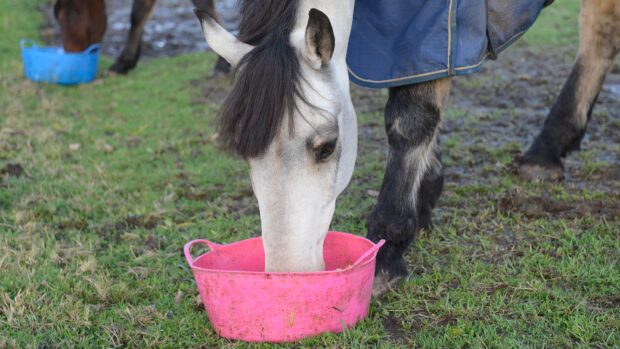An Olympic eventer and a rider who was paralysed in a fall are raising funds for research that in trials has enabled those with spinal cord injuries to regain movement.
Former world champion Ginny Elliot is a patron of Spinal Research, for which trustee Tara Stewart has been raising money since she was paralysed from the neck down in 2014. Tara told H&H the research into neuromodulation, electrical stimulation treatment through the skin or via implants, is the subject of a number of clinical trials worldwide, in which participants have noticed various improvements.
“I’m on a trial involving stimulation through the skin and we’ve had remarkable results,” she said. “I’ve become stronger, recovered some sensation and have been able to activate my legs a bit. When I had my fall, I was told there was no hope; I’d never walk again. A couple of years ago, in Switzerland, a man who’d almost severed his spinal cord was able to walk with an implant.”
Tara was 43 when she had her fall in 2014, while hacking a horse who’d had kissing-spine surgery, the day before she moved him to a yard to progress his rehab.
“I got off his back and asked him to canter and he just exploded bucking,” she said. “Because I was in two-point position, I came straight off. I tucked my head to roll, but didn’t have enough distance and I hit the ground head-first. I heard my neck snap, so I knew exactly what had happened and I was on the ground for five and a half hours. Part of your brain thinks, ‘You know what’s happened, you’re paralysed now,’ but part is in total disbelief.”
Tara’s horse stayed with her, alerting a passer-by to her presence – “so he did save my life, bless him” – and she was taken to hospital, where her survival hung in the balance. She spent months in hospital and rehab.
“Then I got home and thought, ‘What do I do now?’” she said. “I’m a C6/7 tetraplegic, so all four limbs are affected, but I do have some use of my arms and one hand and am not on a ventilator, so I’m better than I could be.”
Tara chose to raise money for the air ambulance and Spinal Research, a charity actively working towards treatment for spinal cord injuries and paralysis.
The current fundraising drive is based around Badminton Horse Trials, this year and next, and an online prize draw. Prizes include a VIP lunch and course-walk with Ginny at Badminton 2023, a craft gin hamper and a Fairfax & Favor bag. Influencer Megan Elphick, who has qualified for the BE90 final at Badminton, is involved, so Ginny will do a course-walk of her course this year, which will be shared on Megan’s Instagram with the prize-draw details.
Enter the draw online by 20 May
Ginny told H&H the research and its implications are “incredibly important”. She started working with the Riding for the Disabled Association in the 1980s and has been a patron of Spinal Research since 1993.
“I’ve had more falls than I can shake a stick at and it’s a bit ‘there but for the grace of God’,” she said, adding that her fundraising efforts so far have included many course-walks, dinners and a four-day ride from Wiltshire to Stoke Mandeville.
“People got sponsorship and joined us because their friend or family member had had an accident and was in a wheelchair, and their stories are heart-rending,” she said. “Tara got hold of me and we hatched this plan, and what better person to work with than Tara? Her enthusiasm, her work ethic – she’s an extraordinary human being.”
Ginny said breaking her leg very badly in a fall in 1997, and the resulting lack of mobility, gave her a hint of what people with spinal cord injuries experience and made her even more keen to help.
“This fundraising is a real push to change people’s lives,” she said. “This neuromodulation is something that can do that.”
Some people in the trials have regained torso function or use of their legs; others have regained bladder and bowel control.
“We’ve got something that’s working and very promising,” Tara said. “We need more trials but the wonderful thing is there’s hope; we believe we can restore function. Everyone’s looking for the ultimate cure but any restoration of function, of control and dignity, would be life-transforming.
“There could also be implications for people who have motor neurone disease or strokes. And as we saw during Covid, amazing things can happen if the money’s there; with the right funding, you can do almost anything.
“It’s a feeling like the sun coming out after a long, long winter. I understand why doctors have to be brutal and tell you there’s no hope, but to have hope now that you might improve — even if I could improve the 10% function of my right hand, to write and type and dress myself, it would be transformational and that’s now within our grasp.”
Spinal Research CEO Harvey Sihota said: “Scientists are making remarkable progress in understanding the spinal cord and what it may take to restore vital functions after injury.
“We currently support a portfolio of 20 research projects, crucially eight of which are being trialled in humans. Funding is now critical to see these important discoveries translated to patients. Your support will help transform the lives of 60,000 people in the UK and more than 2.5 million people living with paralysis worldwide.”
You might also be interested in:

Calls for riders’ fall videos to help prevent future spinal injuries
‘When you live the reality of being in a wheelchair – we don’t want anyone else to join us’

Rider who overcame broken back hopes to inspire others
The rider suffered a compressed L1 vertebrae fracture and an L2 fracture

Subscribe to Horse & Hound magazine today – and enjoy unlimited website access all year round
Horse & Hound magazine, out every Thursday, is packed with all the latest news and reports, as well as interviews, specials, nostalgia, vet and training advice. Find how you can enjoy the magazine delivered to your door every week, plus options to upgrade your subscription to access our online service that brings you breaking news and reports as well as other benefits.




